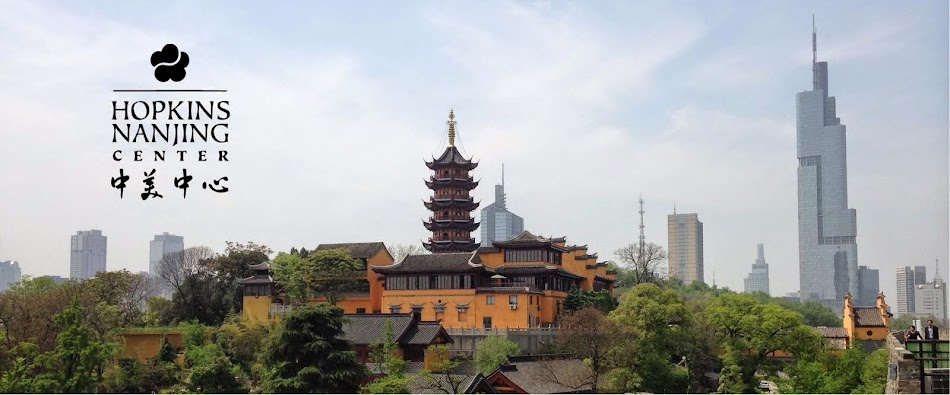 |
| HNC students (left of center) pose with a competing team and a panel of judges after the first round of the Price Monroe Media Law Moot Court Competition. |
This past semester, I had the privilege of taking part in the Price Monroe Media Law Moot Court Competition. Prior to coming to the Hopkins-Nanjing Center (HNC), I had never heard about moot court. However, after an informative lecture held by Professor Thomas Simon, I was excited to get involved in an activity that would challenge me to develop my critical thinking and public speaking skills.
Moot court is a popular activity here at the HNC. For those who are not familiar with its protocol, moot court is usually a law school activity and competition during which students participate in preparing and arguing international law cases in front of judges. Each moot court competition focuses on a different aspect of law and requires students to prepare a complete memo (with a legal foundation) as well as prepare for a verbal argument against an opposing team. At the beginning of the year, interested students interview for the various competitions, and teams are made of both Chinese and international students.
This year the HNC had three teams take part in moot court competitions including the Jessup International Law Moot Court Competition, Price Monroe Media Law Moot Court Competition, and Vis International Commercial Arbitration Moot Court. These three moot court competitions focus on different aspects of international law. Jessup, the world’s largest moot court competition, focuses on a fictional dispute between countries before the International Court of Justice. Price focuses on international media law disputes, and Vis focuses on international commercial arbitration cases. The final rounds for each moot court team take place in three different countries, the United States (Washington D.C.), England (Oxford), and Austria (Vienna) respectively.
While none of the HNC moot court teams qualified to compete in the international rounds this year, students enjoyed the process. Emily Rivera (HNC Certificate ’18), a member of the Jessup International Law Moot Court Competition explained that, “…my experience has been great! The topic is very interesting this year and highly relevant in the international public law arena.” Likewise, Deniz Cem Ozensoy (MAIS ’19) reflected positively on his involvement in the Price Monroe Media Law Moot Court and commented that the competition was “pretty fun, [and] the judges are really cool. I enjoyed the competition quite a lot, more so than preparing for it probably.” I also found the competition portion to be the most invigorating part of the moot court experience. As an oralist I enjoyed speaking in front of the judges and arguing my team’s side of the case.
I encourage any prospective students with interest in law (or developing public speaking or research skills) to get involved. Although taking part in moot court was incredibly time-consuming, and at many times challenging, it was a great experience. I left the competition in Beijing very proud of my team!
Written by Alexandra Hansen, HNC Certificate '18






